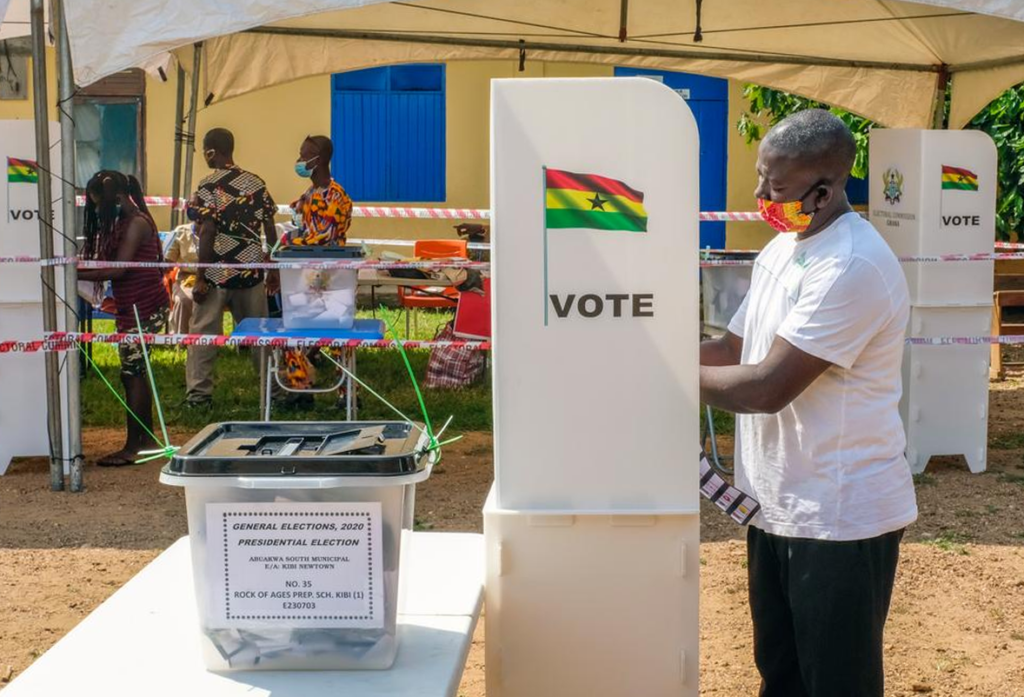The narrative that the New Patriotic Party (NPP) handed over power to the National Democratic Congress (NDC) due to low voter turnout among NPP supporters has been challenged by seasoned pollster Mussa Dankwah, Executive Director of Global InfoAnalytics.
Using empirical data from the organisation’s extensive exit polls, Mr Dankwah debunked the widely circulated claim, offering a deeper analysis of voter behaviour and switching patterns in the 2024 general elections.
According to Dankwah, the notion that NPP voters in their strongholds, particularly the Ashanti and Eastern regions, stayed home en masse is “not entirely true.”
He highlighted that voter apathy was not unique to the NPP but occurred across the political spectrum and throughout the country.
“From our data, those who turned out to vote in the 2024 election included a significant proportion of voters who had supported Nana Addo Dankwa Akufo-Addo in 2020 but switched their allegiance to John Dramani Mahama this time.”
The data revealed that an average of 22% of Nana Addo voters switched to Mahama, compared to an average of 10% of Mahama voters who switched to Dr. Mahamudu Bawumia
Mussa Dankwah provided a regional breakdown of voter switching, emphasizing the nuances in voter behaviour.
In the NPP stronghold of the Ashanti Region, while there was a net gain of 8% for Dr Bawumia, Dankwah noted that it was primarily due to Mahama supporters from 2020 shifting their allegiance to him rather than unwavering loyalty from Nana Addo’s base.
In the North-East Region, Dr Bawumia experienced a 16% net gain, largely fueled by shifts from Mahama voters. However, the pollster strongly asserted that in the remaining 14 regions, President-Elect Mahama made significant inroads.
“JDM made net gains in the rest of the 14 regions on this measure as summarised as follows: Volta 36% net gain; Savannah 35%; Western 27%; Greater Accra 23%; Central 21%; Upper East 21%; Bono East 21%; Oti 10%; Western North 10%; Ahafo 6%; Upper West 6%; Northern 2%; Eastern 2% and Bono 1%.”
These figures, according to Mussa Dankwah underscore a nationwide trend of voter shifts rather than concentrated apathy in specific regions.
Moreover, Mussa Dankwah touted Global InfoAnalytics’ robust polling methodologies and conducted interviews with nearly 288,000 voters between August and December 2024. This included highly accurate telephone polls that mirrored the actual regional results.
He expressed confidence in the organization’s predictive analysis, emphasizing the depth of their voter engagement in the lead-up to the election.
“We told Ghanaians that 84% of voters had already made up their minds before the final three months of the campaign. The intense last-minute campaigning was an exercise in futility and a waste of resources.”
Mussa Dankwah’s analysis suggested that the NPP’s defeat in the 2024 elections was not due to a singular event but rather a culmination of voter discontent that began to take shape as far back as 2022.
“This election was lost in 2022,” he stated bluntly, pointing to governance issues and policy dissatisfaction as key factors that influenced voter sentiment long before the campaign season peaked.
For the NPP, Mussa Dankwah’s insights serve as a call for introspection, challenging the party to move beyond simplistic explanations for its electoral defeat.
The data suggests that rather than relying on voter apathy narratives, the party must address the underlying causes of voter discontent and disloyalty.


